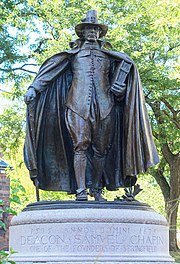| Part of a series on |
| Puritans |
|---|
 |
Historians have produced and worked with a number of definitions of Puritanism, in an unresolved debate on the nature of the Puritan movement of the 16th and 17th century. There are some historians who are prepared to reject the term for historical use.[1] John Spurr argues that changes in the terms of membership of the Church of England, in 1604–6, 1626, 1662, and also 1689, led to re-definitions of the word "Puritan".[2] Basil Hall, citing Richard Baxter considers that "Puritan" dropped out of contemporary usage in 1642, with the outbreak of the First English Civil War, being replaced by more accurate religious terminology.[3] Current literature on Puritanism supports two general points: Puritans were identifiable in terms of their general culture, by contemporaries, which changed over time; and they were not identified by theological views alone.
- ^ Crawford Gribben (16 August 2007). God's Irishmen:Theological Debates in Cromwellian Ireland: Theological Debates in Cromwellian Ireland. Oxford University Press. pp. 205 note 52. ISBN 978-0-19-532531-7. Retrieved 9 November 2012.
- ^ John Spurr (15 October 1998). English Puritanism, 1603-1689. Palgrave Macmillan. p. 4. ISBN 978-0-333-60189-1. Retrieved 9 November 2012.
- ^ Hall, p. 245.
